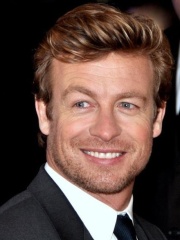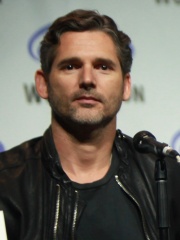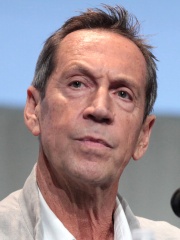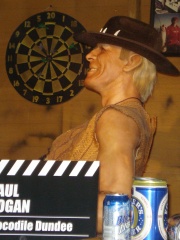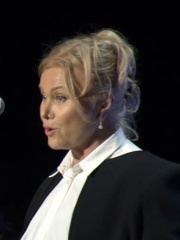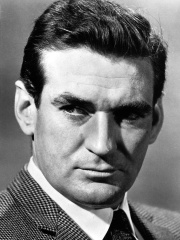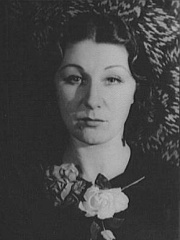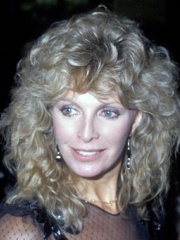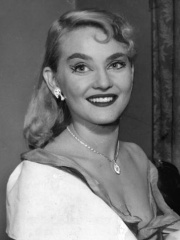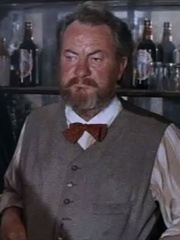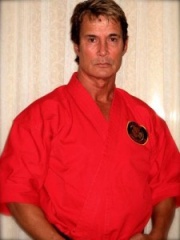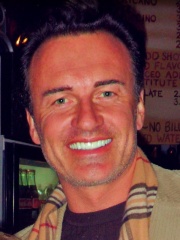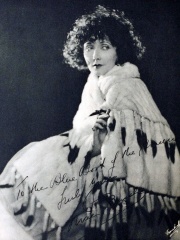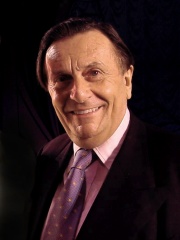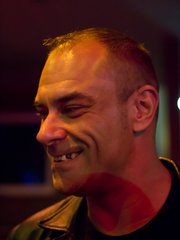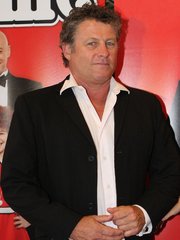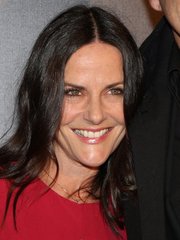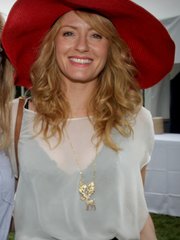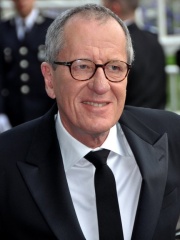
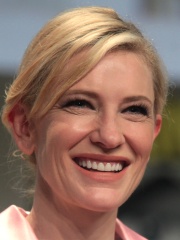
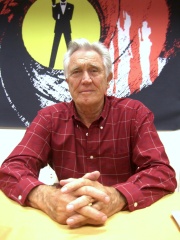
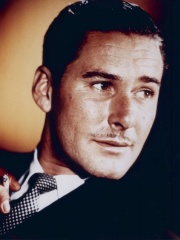
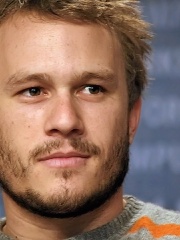
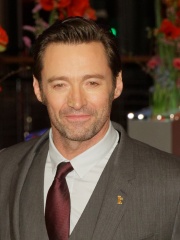
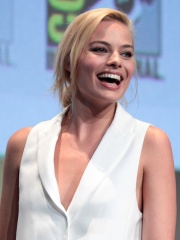
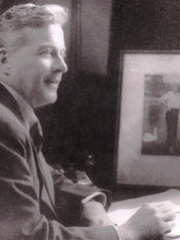
The Most Famous
ACTORS from Australia
Top 10
The following people are considered by Pantheon to be the top 10 most legendary Australian Actors of all time. This list of famous Australian Actors is sorted by HPI (Historical Popularity Index), a metric that aggregates information on a biography's online popularity. Visit the rankings page to view the entire list of Australian Actors.

1. Geoffrey Rush (b. 1951)
With an HPI of 73.35, Geoffrey Rush is the most famous Australian Actor. His biography has been translated into 74 different languages on wikipedia.
Geoffrey Roy Rush (born 6 July 1951) is an Australian actor. Known for often playing eccentric roles on both stage and screen, he has received numerous accolades, including an Academy Award, a Primetime Emmy Award and a Tony Award, making him the only Australian to achieve the Triple Crown of Acting, in addition to three BAFTA Awards and two Golden Globe Awards. Rush is the founding president of the Australian Academy of Cinema and Television Arts and was named the 2012 Australian of the Year. Rush began his professional acting career with the Queensland Theatre Company in 1971. He studied for two years at the L'École Internationale de Théâtre Jacques Lecoq starting in 1975. Rush starred in international productions of Oleanna, Waiting for Godot, The Winter's Tale and The Importance of Being Earnest. He made his Broadway debut in the absurdist comedy Exit the King in 2009 earning the Tony Award for Best Actor in a Play. He received a nomination for Drama Desk Award for Outstanding Actor in a Play for Diary of a Madman in 2011. Rush won the Academy Award for Best Actor for his portrayal of David Helfgott in the drama Shine (1996). He was Oscar-nominated for playing Philip Henslowe in Shakespeare in Love (1998), the Marquis de Sade in Quills (2000), and Lionel Logue in The King's Speech (2010). He played Captain Hector Barbossa in the Pirates of the Caribbean franchise (2003–2017), and Francis Walsingham in Elizabeth (1998) and its 2007 sequel. He also acted in Les Misérables (1998), Frida (2002), Finding Nemo (2003), Intolerable Cruelty (2003), Munich (2005), and The Book Thief (2013). Rush is also known for his performances in television receiving Primetime Emmy Award for Outstanding Lead Actor in a Limited or Anthology Series or Movie nominations for his portrayals of comedian Peter Sellers in the HBO television film The Life and Death of Peter Sellers (2004), and scientist Albert Einstein in National Geographic anthology series Genius (2017), winning for the former.

2. Cate Blanchett (b. 1969)
With an HPI of 71.61, Cate Blanchett is the 2nd most famous Australian Actor. Her biography has been translated into 106 different languages.
Catherine Élise Blanchett ( BLAN-chit; born 14 May 1969) is an Australian actor and producer. Regarded as one of the best performers of her generation, she is recognised for her versatile work across stage and screen. Blanchett has received numerous accolades, including two Academy Awards, four British Academy Film Awards, four Golden Globe Awards and three Screen Actors Guild Awards, in addition to nominations for three Primetime Emmy Awards and a Tony Award. A graduate of the National Institute of Dramatic Art, she began her career on the Australian stage in 1992 and made her feature film debut in 1997. She came to international prominence for her performance as Queen Elizabeth I in the period drama Elizabeth (1998), for which she received her first Academy Award nomination. She won the Academy Award for Best Supporting Actress for her portrayal of Katharine Hepburn in the biopic The Aviator (2004), and Best Actress for playing a neurotic former socialite in the comedy-drama Blue Jasmine (2013). Her other Oscar-nominated roles were in Notes on a Scandal (2006), I'm Not There (2007), Elizabeth: The Golden Age (2007), Carol (2015), and Tár (2022), making her the most-nominated Australian. Her biggest commercial successes include The Lord of the Rings trilogy (2001–2003), its prequel The Hobbit trilogy (2012–2014), Indiana Jones and the Kingdom of the Crystal Skull (2008), The Curious Case of Benjamin Button (2008), Cinderella (2015), Thor: Ragnarok (2017), Ocean's 8 (2018), and Don't Look Up (2021). Blanchett has performed in over twenty stage productions. She and her husband, Andrew Upton, were the artistic directors of the Sydney Theatre Company from 2008 to 2013. Some of her stage roles during this period were in revivals of A Streetcar Named Desire, Uncle Vanya, Big and Little and The Maids. She made her Broadway debut in 2017 in The Present, for which she was nominated for the Tony Award for Best Actress in a Play. She portrayed Phyllis Schlafly in the FX on Hulu miniseries Mrs. America (2020) and a journalist in Apple TV+ miniseries Disclaimer (2024), both of which earned her nominations for the Primetime Emmy Award for Outstanding Lead Actress in a Limited or Anthology Series or Movie. Blanchett is the recipient of several honorary awards. The Australian government awarded her the Centenary Medal in 2001, and she was appointed a Companion of the Order of Australia in 2017. In 2012, she was appointed Chevalier of the Order of Arts and Letters by the French government. Blanchett was honoured by the Museum of Modern Art and received the British Film Institute Fellowship in 2015. Time named her one of its 100 most influential people in the world in 2007. In 2018, she was ranked among the world's highest-paid actresses. She also received honorary Doctor of Letters degrees from the University of New South Wales, University of Sydney and Macquarie University.

3. George Lazenby (b. 1939)
With an HPI of 71.01, George Lazenby is the 3rd most famous Australian Actor. His biography has been translated into 55 different languages.
George Robert Lazenby (; born 5 September 1939) is an Australian retired actor. He began his professional career as a model and an actor in commercials. He had no film acting experience when he was cast as the fictional British spy James Bond for the film On Her Majesty's Secret Service (1969). Lazenby replaced the original Bond actor, Sean Connery, but declined to return for subsequent films in the series, instead pursuing roles in Universal Soldier (1971), Who Saw Her Die? (1972), The Shrine of Ultimate Bliss (1974), and The Man from Hong Kong (1975). Lazenby's single portrayal of Bond and lack of standing as a favourite in the series has resulted in his name being used as a metaphor for forgettable or unremarkable acting efforts in other entertainment franchises and for entities that are largely ignored. In 2024, Lazenby retired from acting, citing both his age and his desire to spend more time with his family.

4. Errol Flynn (1909 - 1959)
With an HPI of 70.82, Errol Flynn is the 4th most famous Australian Actor. His biography has been translated into 71 different languages.
Errol Leslie Thomson Flynn (20 June 1909 – 14 October 1959) was an Australian and American actor who achieved worldwide fame during the Golden Age of Hollywood. He was known for his romantic swashbuckler roles, frequent partnerships with Olivia de Havilland and reputation for his womanising and hedonistic personal life. Flynn's roles include Robin Hood in The Adventures of Robin Hood (1938), which was later named by the American Film Institute as the 18th-greatest hero in American film history; the lead role in Captain Blood (1935); Major Geoffrey Vickers in The Charge of the Light Brigade (1936); and as the hero in a number of Westerns such as Dodge City (1939), Santa Fe Trail, Virginia City (both 1940) and San Antonio (1945). Flynn was posthumously awarded two stars on the Hollywood Walk of Fame for his contributions to the motion picture and television industries in 1960.
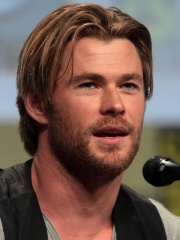
5. Chris Hemsworth (b. 1983)
With an HPI of 70.56, Chris Hemsworth is the 5th most famous Australian Actor. His biography has been translated into 85 different languages.
Christopher Hemsworth (born 11 August 1983) is an Australian actor. Born and raised in Melbourne, Victoria, and Bulman, Northern Territory, he rose to prominence playing Kim Hyde in the Australian television series Home and Away (2004–2007) before beginning a film career in Hollywood. In the Marvel Cinematic Universe, Hemsworth starred as Thor in the 2011 film of the same name and reprised the role in several subsequent installments, which established him among the world's highest-paid actors. His other film roles include the action films Star Trek (2009), Snow White and the Huntsman (2012) and its sequel The Huntsman: Winter's War (2016), Red Dawn (2012), Blackhat (2015), Men in Black: International (2019), Extraction (2020) and its 2023 sequel, the thriller A Perfect Getaway (2009), and the comedy Ghostbusters (2016). Hemsworth's most critically acclaimed films include the comedy horror The Cabin in the Woods (2012), the biographical sports film Rush (2013) in which he portrayed James Hunt, the action film Furiosa: A Mad Max Saga (2024)—which earned him a nomination for the AACTA Award for Best Actor in a Supporting Role—and the animated film Transformers One (2024) in which he voiced Optimus Prime.

6. Heath Ledger (1979 - 2008)
With an HPI of 69.95, Heath Ledger is the 6th most famous Australian Actor. His biography has been translated into 98 different languages.
Heath Andrew Ledger (4 April 1979 – 22 January 2008) was an Australian actor. After playing roles in Australian television and film productions during the 1990s, he moved to the United States in 1998 to further develop his film career. His work consisted of 20 films in a variety of genres, including 10 Things I Hate About You (1999), The Patriot (2000), A Knight's Tale, Monster's Ball (both 2001), Casanova, Lords of Dogtown, Brokeback Mountain (all 2005), Candy (2006), I'm Not There (2007), The Dark Knight (2008), and The Imaginarium of Doctor Parnassus (2009), the latter two posthumously released. He produced and directed music videos and aspired to be a film director. For his portrayal of Ennis Del Mar in Ang Lee's Brokeback Mountain, he received nominations for the BAFTA Award, Screen Actors Guild Award, Golden Globe Award and the Academy Award for Best Actor. In 2007, he played a fictional actor, Robbie Clark, one of six characters embodying aspects of Bob Dylan's life and persona in Todd Haynes's I'm Not There. Ledger was found dead in January 2008 from an accidental overdose of prescription drugs. A few months before his death, he had finished filming his role as the Joker in The Dark Knight; the performance brought him praise and popularity, and numerous posthumous awards, including an Academy Award, a BAFTA Award, a Golden Globe, a SAG Award, and a Critics' Choice Award, all for Best Supporting Actor.

7. Hugh Jackman (b. 1968)
With an HPI of 69.44, Hugh Jackman is the 7th most famous Australian Actor. His biography has been translated into 95 different languages.
Hugh Michael Jackman (born 12 October 1968) is an Australian actor, singer, and producer. Beginning in theatre and television, Jackman landed his breakthrough role as Wolverine, playing it across the X-Men film franchise and in the Marvel Cinematic Universe from X-Men (2000) to Deadpool & Wolverine (2024). Prominent on both screen and stage, he has received various accolades, including a Primetime Emmy Award, a Grammy Award and two Tony Awards, along with nominations for an Academy Award and a British Academy Film Award. Jackman was appointed a Companion of the Order of Australia in 2019. Jackman has headlined films in various genres, including the romantic comedy Kate & Leopold (2001), the action-horror Van Helsing (2004), the drama The Prestige (2006), the period romance Australia (2008), the science fiction Real Steel (2011), the musical Les Misérables (2012), the thriller Prisoners (2013), the musical The Greatest Showman (2017), the political drama The Front Runner (2018), and the crime drama Bad Education (2019). For his role as Jean Valjean in Les Misérables, he was nominated for the Academy Award for Best Actor and won a Golden Globe Award for Best Actor, and for The Greatest Showman soundtrack, Jackman received a Grammy Award for Best Compilation Soundtrack. He also provided voice roles in the animated films Flushed Away, Happy Feet (both 2006), Rise of the Guardians (2012) and Missing Link (2019). Jackman is also known for his early theatre roles in the original Australian productions of Beauty and the Beast as Gaston in 1995 and Sunset Boulevard as Joe Gillis in 1996. He earned a Laurence Olivier Award nomination for his performance as Curly McLain in the West End revival of Oklahoma! in 1998. In 2002, he made his American stage debut in a concert of Carousel as Billy Bigelow at Carnegie Hall. On Broadway, he won the 2004 Tony Award and Drama Desk Award for Best Actor in a Musical for his role of Peter Allen in The Boy from Oz. From 2021 to 2023, Jackman starred as con man Harold Hill in the Broadway revival of the musical The Music Man, earning another Tony Award nomination. A four-time host of the Tony Awards, he won an Emmy Award for hosting the 2005 ceremony. He also hosted the 81st Academy Awards in 2009.

8. Margot Robbie (b. 1990)
With an HPI of 68.15, Margot Robbie is the 8th most famous Australian Actor. Her biography has been translated into 85 different languages.
Margot Elise Robbie ( MAR-goh ROB-ee; born 2 July 1990) is an Australian actress and producer. Known for her work in both blockbuster and independent films, her accolades include nominations for three Academy Awards, four Golden Globe Awards and six BAFTA Awards. Time named Robbie one of the 100 most influential people in the world in 2017, and Forbes named her the world's highest-paid actress in 2023. Born and raised in Queensland, Robbie began her career in 2008 on the television series Neighbours, on which she was a regular until 2011. After moving to the United States, she led the television series Pan Am (2011–2012) and had her breakthrough in 2013 with Martin Scorsese's black comedy film The Wolf of Wall Street. She achieved wider recognition with starring roles as Jane Porter in The Legend of Tarzan (2016), and as Harley Quinn in the DC Extended Universe (2016–2021). Robbie received critical acclaim and a nomination for the Academy Award for Best Actress for her portrayal of figure skater Tonya Harding in the biopic I, Tonya (2017). This acclaim continued for her performances as Queen Elizabeth I in Mary Queen of Scots (2018), Sharon Tate in Once Upon a Time in Hollywood (2019), and a Fox News employee in Bombshell (2019). The last of these earned her a nomination for the Academy Award for Best Supporting Actress. Robbie has since starred as an aspiring actress in the period film Babylon (2022) and the titular fashion doll in the fantasy comedy Barbie (2023), which emerged as her highest-grossing release and, as its producer, earned her a nomination for the Academy Award for Best Picture. Robbie and her husband, filmmaker Tom Ackerley, co-founded the production company LuckyChap Entertainment in 2014, under which they have produced several films, including I, Tonya, Promising Young Woman (2020), Barbie, and Saltburn (2023), as well as the Hulu series Dollface (2019–2022) and the Netflix miniseries Maid (2021).

9. Lionel Logue (1880 - 1953)
With an HPI of 66.85, Lionel Logue is the 9th most famous Australian Actor. His biography has been translated into 25 different languages.
Lionel George Logue (26 February 1880 – 12 April 1953) was an Australian speech and language therapist and amateur stage actor who helped King George VI manage his stammer.
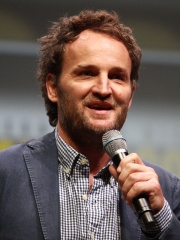
10. Jason Clarke (b. 1969)
With an HPI of 66.14, Jason Clarke is the 10th most famous Australian Actor. His biography has been translated into 37 different languages.
Jason Clarke (born 17 July 1969) is an Australian actor. He has appeared in many TV series, and is known for playing Tommy Caffee on the television series Brotherhood. He has also appeared in many films, often as an antagonist. His film roles include Death Race (2008), Zero Dark Thirty (2012), Lawless (2012), White House Down (2013), Dawn of the Planet of the Apes (2014), Terminator Genisys (2015), Everest (2015), All I See Is You (2016), Mudbound (2017), The Man with the Iron Heart (2017), Chappaquiddick (2017), First Man (2018), Pet Sematary (2019), The Devil All the Time (2020), and Oppenheimer (2023). In 2022, he starred in the HBO sports drama series Winning Time: The Rise of the Lakers Dynasty as former Los Angeles Lakers player turned coach Jerry West.
People
Pantheon has 238 people classified as Australian actors born between 1858 and 2005. Of these 238, 215 (90.34%) of them are still alive today. The most famous living Australian actors include Geoffrey Rush, Cate Blanchett, and George Lazenby. The most famous deceased Australian actors include Errol Flynn, Heath Ledger, and Lionel Logue. As of April 2024, 35 new Australian actors have been added to Pantheon including Conan Stevens, Peter Phelps, and Peter O'Brien.
Living Australian Actors
Go to all RankingsGeoffrey Rush
1951 - Present
HPI: 73.35
Cate Blanchett
1969 - Present
HPI: 71.61
George Lazenby
1939 - Present
HPI: 71.01
Chris Hemsworth
1983 - Present
HPI: 70.56
Hugh Jackman
1968 - Present
HPI: 69.44
Margot Robbie
1990 - Present
HPI: 68.15
Jason Clarke
1969 - Present
HPI: 66.14
Simon Baker
1969 - Present
HPI: 65.98
Eric Bana
1968 - Present
HPI: 65.67
Jonathan Hyde
1948 - Present
HPI: 65.66
Paul Hogan
1939 - Present
HPI: 65.43
Deborra-Lee Furness
1955 - Present
HPI: 64.65
Deceased Australian Actors
Go to all RankingsErrol Flynn
1909 - 1959
HPI: 70.82
Heath Ledger
1979 - 2008
HPI: 69.95
Lionel Logue
1880 - 1953
HPI: 66.85
Rod Taylor
1930 - 2015
HPI: 66.10
Judith Anderson
1897 - 1992
HPI: 65.33
Cassandra Harris
1948 - 1991
HPI: 63.37
Diane Cilento
1933 - 2011
HPI: 60.37
Leo McKern
1920 - 2002
HPI: 60.13
Richard Norton
1950 - 2025
HPI: 59.24
Julian McMahon
1968 - 2025
HPI: 57.80
Mae Busch
1891 - 1946
HPI: 57.11
Barry Humphries
1934 - 2023
HPI: 56.00
Newly Added Australian Actors (2025)
Go to all RankingsConan Stevens
1969 - Present
HPI: 46.83
Peter Phelps
1960 - Present
HPI: 44.78
Peter O'Brien
1960 - Present
HPI: 44.17
Gia Carides
1964 - Present
HPI: 44.06
Lara Cox
1978 - Present
HPI: 42.97
Charlie Vickers
1992 - Present
HPI: 41.99
Felix Mallard
1998 - Present
HPI: 40.26
Eamon Farren
1985 - Present
HPI: 40.06
Cleo Massey
1993 - Present
HPI: 39.76
Catherine Sutherland
1974 - Present
HPI: 39.67
Hélène Joy
1978 - Present
HPI: 39.58
Deniz Akdeniz
1990 - Present
HPI: 39.54
Overlapping Lives
Which Actors were alive at the same time? This visualization shows the lifespans of the 23 most globally memorable Actors since 1700.

